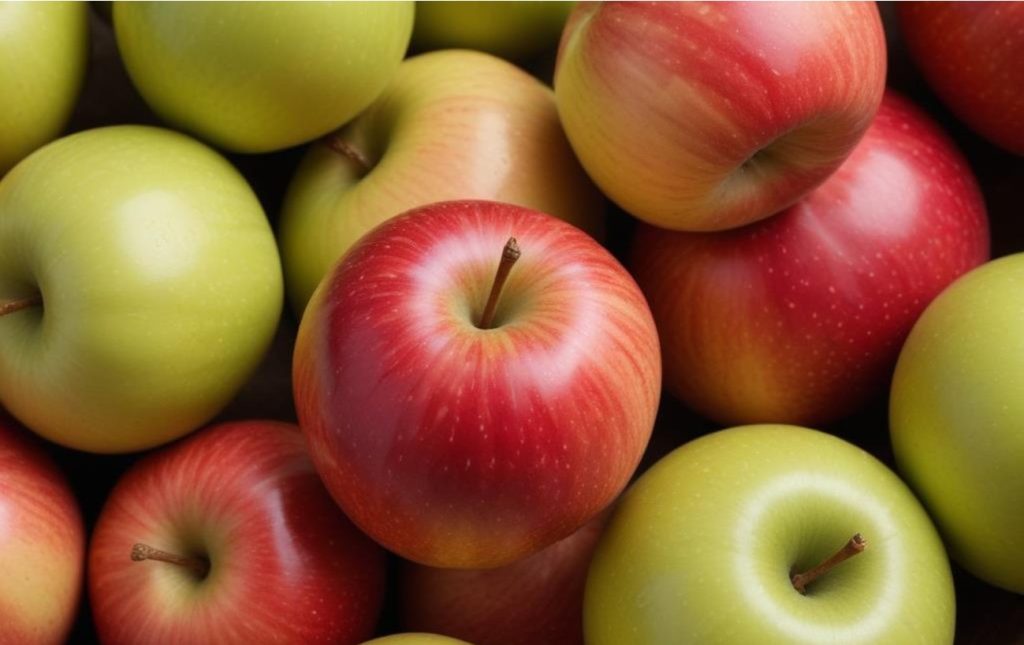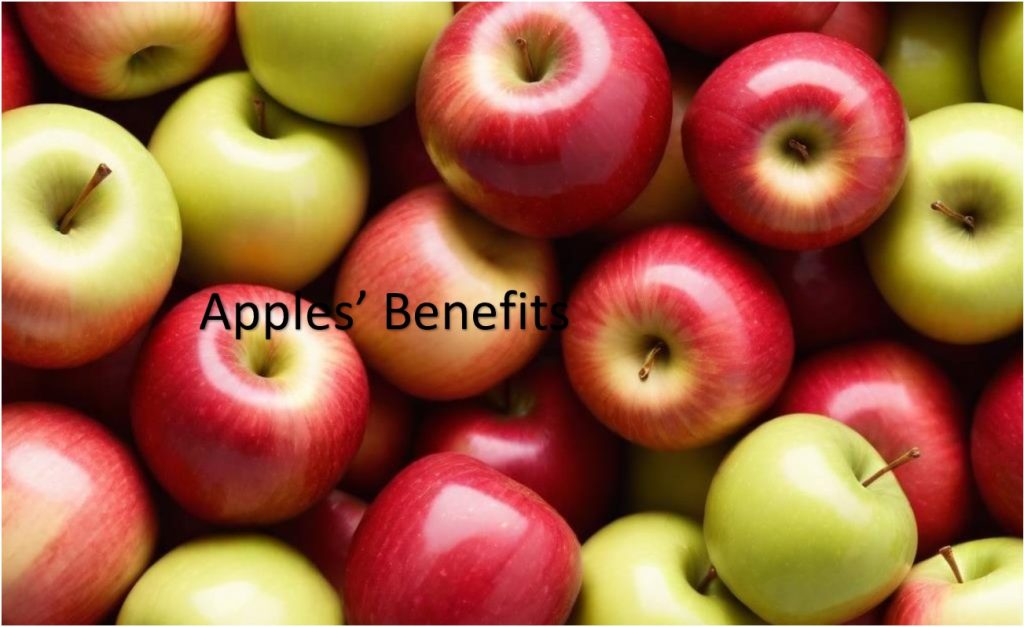Benefits of Apples
Benefits of Apples
There are abundent benefits of apples which are known to many of us. Apples are rich in nutrients like fiber, vitamin C, and various antioxidants. They can help support weight loss, promote heart health, and it may lower the risk of diabetes. Apples are beneficial for gut health due to their fiber content. A medium-sized apple typically contains about 95 calories and is low in fat. The fruit includes compounds such as quercetin, which are associated with numerous health benefits
Apples, The Classic Fruit
Apples, the classic fruit that have graced our diets and stories for centuries. Their crunch and sweetness make them a favorite among fruits, and their nutritional benefits are lauded by health enthusiasts around the globe.
What Makes Apples Healthy?

An In-depth Nutritional Profile of Apples
Diving into the nutritional cornucopia that apples offer, it’s evident they are more than just a tasty snack. Packed with several vitamins, like vitamin C, and a host of antioxidants, apples provide a low-calorie option that’s high in dietary fiber.
Examining the Health Benefits of Apples:
Beyond Just Keeping the Doctor Away
Apples are not merely a fruit; they are a bundle of health benefits. Regular consumption will help to a reduced risk of chronic diseases. It includes type 2 diabetes, and they play a vital role in promoting gut health due to their fiber content.
Caloric Content of Apples:
A Weight-Watcher’s Dream?
When it comes to managing weight, apples are a formidable ally. Their high fiber and low-calorie count make them an ideal food for those looking to maintain or reduce their weight without sacrificing nutrition.
Introduction to Apples and Their Popularity in Diet
Apples, the quintessential fruit, are celebrated for their crisp texture and sweet-tart flavor. Revered as a symbol of health, they say “an apple a day keeps the doctor away”—and with good reason. This humble fruit is a heavyweight in nutritional value, offering a plethora of vitamins, minerals, and fiber, all packed into a low-calorie package that’s perfect for on-the-go snacking.
What Makes Apples Healthy?
Apples: Health Benefits, Risks, and Nutrition Facts
How many Calories in an Apple

Benefits of Apples
An in-depth analysis Into the Nutritional Profile of Apples
When it comes to nutrition, apples are a veritable treasure trove. They are brimming with essential nutrients that are vital for our well-being. A medium-sized apple, roughly about 182 grams, typically contains:
Calories: 95
Water: 86%
Protein: 0.3 grams
Carbohydrates: 25 grams
Sugars: 19 grams (including fructose, glucose, and sucrose)
Fiber: 4 grams
Fat: 0.2 grams
Potassium: 6% of the RDI
Vitamin C: 14% of the RDI
Vitamin K: 5% of the RDI
This nutritional makeup supports a myriad of bodily functions, from bolstering the immune system to maintaining a healthy heartbeat.
Examining the Health Benefits of Apples:
Eat an Apple day and Keep the Doctor Away
The adage about an apple a day is steeped in truth. Apples boast a compendium of health benefits that are hard to ignore. The fiber in apples, particularly pectin, is a prebiotic that provides the good bacteria in your gut. This can lead to improved digestion and metabolic health. Moreover, the polyphenols in apples, which function as antioxidants have been related to lower blood pressure and stroke risk. They also have a role in reducing the risk of diabetes and may have anti-cancer properties.
Caloric Content of Apples:
A Weight-Watcher’s Dream?
For those mindful of their waistlines, apples are a boon. A medium apple has around 95 calories, making it a satiating, low-calorie snack that can aid in weight management. The fiber in apples not only keeps you full but also slows down digestion, reducing the urge to binge on less healthy options. Furthermore, apples have a low energy density, meaning the fruit provides lesser calories than the same weight of other higher-calorie foods—a key factor for weight loss.
Apple Varieties and Their Unique Qualities
Over 7,500 varieties of apples grown worldwide, there’s a type for every palate. From the sweet Honeycrisp to the tart Granny Smith, each variety comes with its distinct flavor profile and nutritional benefits. Some varieties may have higher fiber content, while others may boast more antioxidants. This diversity not only adds excitement to your diet but also allows you to reap various health benefits.
Incorporating Apples into Your Diet:
Delectable and Healthy Recipes
Apples are extremely versatile and can be used in a plethora of recipes. Whether you’re baking them into a pie, slicing them up for a salad, or simply enjoying them raw, there’s no shortage of ways to enjoy this nutritious fruit. Here are a few healthy recipes to get you started:
Baked apples with cinnamon and nutmeg – a cozy, low-calorie dessert.
Apple and walnut salad with a light vinaigrette – perfect for a refreshing lunch.
Homemade apple chips – a crunchy, healthy snack.
Apple and peanut butter – a classic combination for a protein-packed treat.
Conclusion | Health Benefits of Apples
An Apple a Day Is More Than Just a Saying
In conclusion, apples are more than just a staple in folklore and lunchboxes. They are a power station of nutrition and health benefits that can play a outstanding role in a balanced diet. With their wide variety of types and ways to enjoy them, apples are not just a testament to nature’s bounty but also to the delicious ways we can maintain our health.
Let’s address the FAQs related to apples, their benefits, nutrition, and caloric content.
How many calories are in an apple?
A medium-sized apple typically contains about 95 calories. It may vary slightly depending on the variety and size.
What nutrients can be found in apples?
Apples are wealthy in essential nutrients such as vitamin C, dietary fiber, potassium, and various antioxidants, including quercetin, catechin, and chlorogenic acid.
Can eating apples help with weight loss?
Yes, due to the availability of high fiber content and low calorie, apples can help you feel full longer time and reduce overall calorie intake, which can contribute to weight loss.
Are the skins of apples nutritious?
Absolutely! The skin of the apple contains the majority of the fiber and antioxidants. It’s advisable to eat apples with their skin to maximize their health benefits.
Do apples affect blood sugar levels?
Apples have a low glycemic index, which means they release sugar slowly into the bloodstream. This helps to support stable blood sugar levels and makes them a good option for people with diabetes.
Can apples reduce the risk of chronic diseases?
Several studies show that the antioxidants and phytochemicals in apples can contribute to a decreased risk of heart diseases, diabetes, and cancer.
How can I incorporate more apples into my diet?
Apples can be eaten raw, cooked, or baked. You can add them to salads, cereals, make apple sauce, or simply have them as a snack with some nut butter.
What is the best time to eat an apple?
You can enjoy apples at any time of the day. However, having an apple before meals can be a great way to reduce hunger and control portion sizes.
Can apples cause any adverse effects?
Apples are generally safe for most people. However, consuming a large number of apples might lead to excessive fiber intake, which can cause digestive discomfort.
Are organic apples better than conventionally grown apples?
You should know that organic apples are produced without synthetic pesticides or fertilizers. Some people prefer organic apples to reduce exposure to these chemicals, but both types offer similar nutritional benefits.
Need Help or Advice in Academic Writing
See Samples
https://independent.academia.edu/shamsulIslam8
Would you like more advice? Do you have good practices to share? Please feel free to express yourself in the comments. Also, if you want help in writing content to drive more traffic and boost conversions, please get in touch through Contact our team or send your requirements here.
Sources:
Details
6. “Apples and Chronic Disease”
7. “Incorporating Apples into Your Diet”
